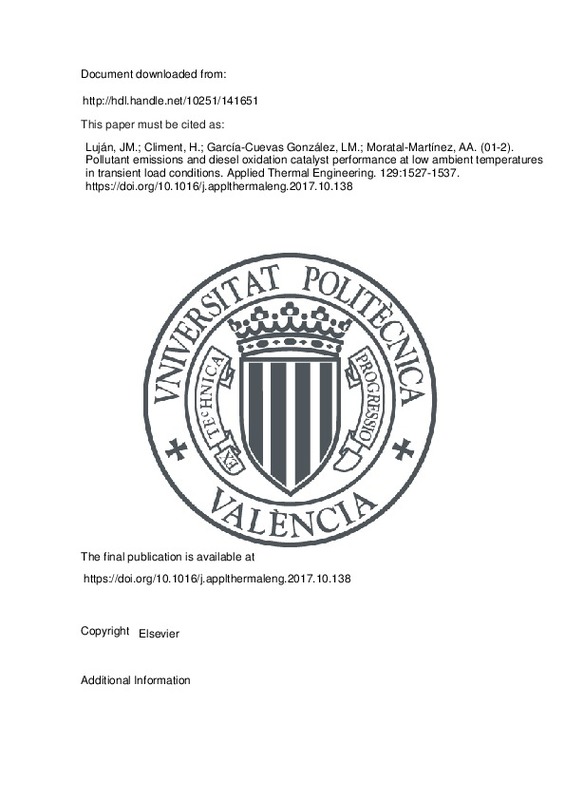JavaScript is disabled for your browser. Some features of this site may not work without it.
Buscar en RiuNet
Listar
Mi cuenta
Estadísticas
Ayuda RiuNet
Admin. UPV
Pollutant emissions and diesel oxidation catalyst performance at low ambient temperatures in transient load conditions
Mostrar el registro sencillo del ítem
Ficheros en el ítem
| dc.contributor.author | Luján, José M.
|
es_ES |
| dc.contributor.author | Climent, H.
|
es_ES |
| dc.contributor.author | García-Cuevas González, Luis Miguel
|
es_ES |
| dc.contributor.author | Moratal-Martínez, Ausias Alberto
|
es_ES |
| dc.date.accessioned | 2020-04-28T06:02:27Z | |
| dc.date.available | 2020-04-28T06:02:27Z | |
| dc.date.issued | 2018-01 | es_ES |
| dc.identifier.issn | 1359-4311 | es_ES |
| dc.identifier.uri | http://hdl.handle.net/10251/141651 | |
| dc.description.abstract | [EN] In this paper an experimental analysis of the ambient temperature effect on diesel engine pollutant emissions is carried out. The study is focused on hydrocarbons and carbon monoxide of both engine out pollutants formation analysis and diesel oxidation catalyzer (DOC) performance. The experiments were carried out at transient engine load conditions of Worldwide harmonized Light vehicles Test Cycle (WLTC) at two levels of ambient temperature: 20ºC and -7ºC. The study presented in this work shows significant different results depending on the pollutant analysed. Regarding hydrocarbons, a significant dependence of pollutant formation on ambient temperature is observed, being the emissions at -7 ºC between two and three times the emissions at 20 ºC. The DOC performance between temperatures shows similar conversion efficiency. In the case of carbon monoxide formation, temperature dependence plays a less important role than the engine load conditions. The reduction of air fuel ratio at transient conditions drives to unsteady CO profiles emissions along the WLTC that reduce the pollutant conversion with a greater negative impact at -7 ºC. | es_ES |
| dc.description.sponsorship | The authors of this paper wish to thank Juan Antonio Lopez Cascant for his invaluable work during the laboratory setup and the experimental campaign. Authors also want to acknowledge the "Apoyo para la investigacion y Desarrollo (PAID)", grant for doctoral studies (FPI S1 2015 2512), of Universitat Politecnica de Valencia. | es_ES |
| dc.language | Inglés | es_ES |
| dc.publisher | Elsevier | es_ES |
| dc.relation.ispartof | Applied Thermal Engineering | es_ES |
| dc.rights | Reconocimiento - No comercial - Sin obra derivada (by-nc-nd) | es_ES |
| dc.subject | Diesel oxidation catalyzer | es_ES |
| dc.subject | Engine out emissions | es_ES |
| dc.subject | Cold conditions | es_ES |
| dc.subject | Transient engine loads | es_ES |
| dc.subject.classification | MAQUINAS Y MOTORES TERMICOS | es_ES |
| dc.subject.classification | INGENIERIA AEROESPACIAL | es_ES |
| dc.title | Pollutant emissions and diesel oxidation catalyst performance at low ambient temperatures in transient load conditions | es_ES |
| dc.type | Artículo | es_ES |
| dc.identifier.doi | 10.1016/j.applthermaleng.2017.10.138 | es_ES |
| dc.relation.projectID | info:eu-repo/grantAgreement/UPV//FPI S1 2015 2512/ | es_ES |
| dc.rights.accessRights | Abierto | es_ES |
| dc.contributor.affiliation | Universitat Politècnica de València. Departamento de Máquinas y Motores Térmicos - Departament de Màquines i Motors Tèrmics | es_ES |
| dc.description.bibliographicCitation | Luján, JM.; Climent, H.; García-Cuevas González, LM.; Moratal-Martínez, AA. (2018). Pollutant emissions and diesel oxidation catalyst performance at low ambient temperatures in transient load conditions. Applied Thermal Engineering. 129:1527-1537. https://doi.org/10.1016/j.applthermaleng.2017.10.138 | es_ES |
| dc.description.accrualMethod | S | es_ES |
| dc.relation.publisherversion | https://doi.org/10.1016/j.applthermaleng.2017.10.138 | es_ES |
| dc.description.upvformatpinicio | 1527 | es_ES |
| dc.description.upvformatpfin | 1537 | es_ES |
| dc.type.version | info:eu-repo/semantics/publishedVersion | es_ES |
| dc.description.volume | 129 | es_ES |
| dc.relation.pasarela | S\350921 | es_ES |
| dc.contributor.funder | Universitat Politècnica de València | es_ES |







![[Cerrado]](/themes/UPV/images/candado.png)

